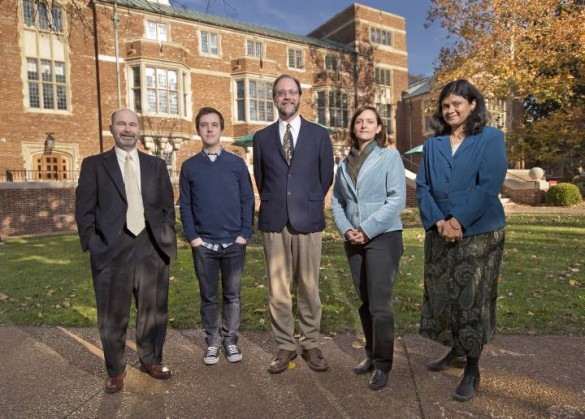
The new Vanderbilt Institute for Digital Learning is digging into its work to research, innovate and support digital learning with a new website, a new program to fund faculty exploration of digital learning, graduate fellows, a faculty advisory committee and more.
“We’ve hit the ground running,” Douglas Fisher, VIDL director, said. “We’ve just had two massive, open, online courses finish up; we are currently overseeing the production of others; and we are doing a slew of other things, like strengthening faculty research proposals with letters of support for education and other broader impact plans.”
Housed in the newly renovated Alumni Hall, VIDL is now fully staffed. (Read more about the VIDL team). In addition to moving into its actual home, the institute has launched a new virtual home, www.vanderbilt.edu/vidl, which showcases the institute’s people, programs and news.
Seed funding for faculty
In Spring 2014, VIDL will begin a yearly faculty seed funding program in digital learning to support a wide variety of efforts such as development of massive, open, online courses (MOOCs); creation of open, crowd-sourced textbooks; data mining of student access to Coursera online courses and YouTube educational videos; studies of cultural blending among MOOC students;
preparing virtual reality and video material for an on-campus course and much more. The institute also offers research and instructional support for others interested in studying and using digital technology for teaching and learning.
Graduate fellows
This fall, VIDL launched a new graduate fellow program. The first three graduate fellows are all Ph.D. students hailing from diverse programs: religious studies, organic chemistry and clinical psychology. All three are interested in studying how digital technologies – broadly defined – can be developed and adapted to enrich the experience of students in traditional and digital classrooms and also as a foundation for innovation in their chosen fields of study.
Advisory council
VIDL has established a faculty advisory council that meets and communicates regularly to discuss important issues in digitally-enhanced learning, such as data collection, curation, and dissemination policies; criteria for vetting faculty innovation proposals; and vision on the rapidly changing landscape of digital learning, ranging from research opportunities, educational practice, and business models. Committee members are drawn from all schools of the university; the full list of members for 2013-2014 is posted on the VIDL website.
By Spring 2014, VIDL will establish an advisory council of students and alumni analogous to its faculty advisory council to inform the institute’s vision and operations.
VIDL works with and reports to Associate Provost for Undergraduate Education and Digital Learning Cynthia Cyrus and interfaces with many other units on campus.
For more information, visit the VIDL website.